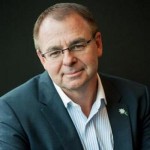Trumping the Politics of Fear – a Critical Role for the NFP Sector

2 February 2017 at 8:10 am
If we want to trump Trump, the charities and not-for-profit sector needs to be much more active and effective in telling its stories, writes David Crosbie, CEO of the Community Council for Australia in his first article for Pro Bono News for 2017.
Safety ranks second on Maslow’s hierarchy of human needs, only surpassed by the need for physiological survival – food, water and sleep. Fear and safety are powerful drivers of human beliefs and behaviour. The politics of fear has always provided fertile grounds for those seeking political power.

Trump’s discriminatory approach to border protection is rationalised by the need to keep Americans safe, even though the decree he has enacted will do the opposite. Most acts of terrorism in the US are committed by homegrown citizens who have been radicalised in one way or another.
The best defense against extremist Muslim radicalisation is support for the “moderates” – those who actually follow the Muslim faith. Bringing people together makes us safer, driving people apart makes us less safe. None of this is contentious or even particularly hard to understand. Unfortunately, in the world where a reality TV star commands more respect than a Nobel Laureate, it is politically powerful to stand on a platform of fear and claim safety as justification for divisive policies.
If the safety of the American people was the strongest rationale for presidential decrees, US gun laws would have been changed many years ago. According to the peddlers of “alternative facts”, guns keep people safe in the US despite the non-alternative facts that in 2015 there were more than 50 school shootings and over 13,000 people killed by firearms – excluding suicides.
While Trump provides a classic example, the politics of fear can have a subtler presentation.
Victorian Premier Daniel Andrews is apparently “too soft”. In recent days he has effectively transferred youth detention management to the corrections system after a “mass breakout of young offenders” from Malmsbury Youth Detention Centre lead to a “shocking crime spree” of stolen cars and police chases. The latest incident follows a series of issues within youth detention centres that are apparently increasingly difficult to manage.
The Victorian government had already been reviewing police car chase laws and the current bail system. Both apparently “need a dramatic shift in the presumption of innocence” after a bail magistrate allowed someone to be released on bail who then committed the unthinkable Bourke Street carnage using his car to kill and maim innocent people.
Having taught in prisons and youth detention centres, spent many hours in courts supporting families facing very challenging life circumstances, and read a great deal of the literature on crime and effective prevention strategies, I struggle to understand how a move to a more punitive system of corrections will make Victorians safer.
In Victoria, across Australia and around the world there are many charities and not-for-profit organisations demonstrating the value of considered interventions to reduce crime and recidivism. Strengthening their role, investing more in their work, has clearly been shown to make us all safer.
Unfortunately, the success of many interventions and support programs in achieving greater safety is not what we read about in our newspapers or see in our news services. The work of many in the charities and not-for-profit sector building individual and community engagement and capacity goes largely unheralded. We seem more likely to focus on the need for targeted investment in addressing the tertiary end of crime – policing, our courts, our prisons, our laws.
The best return on investments to making us all safer will come from spending more in the systems that do make a difference – family support, early intervention, education, housing, health services (especially mental health and drug treatment), employment, cultural and recreational engagement.
At CCA, we have recognised the importance of talking about the value of our sector, sharing the success stories, showing how we make a difference. As a sector, we have not been very good at promoting our achievements or effectively communicating what our success means in real terms, like reduced crime.This is one of the drivers behind the CCA Australia We Want report and the solutions forums we will be running this year.
As we enter the second month of what looks like being a very interesting year ahead, it would be good to see more people in our sector seizing the opportunities to promote the value of their work. This “self-promotion” advocacy is critical, not only because it validates our clients, our community, our work and our organisations, but also because it helps focus the public discourse on solutions rather than schisms.
The politics of fear will always be part of how power is gained and exerted in the world, but demonstrating how we can and do make our communities safer is a powerful mediator. A good anecdote can be an antidote to fear. If we want to trump Trump, we need to be much more active and effective in telling our stories.
About the author: David Crosbie is CEO of the Community Council for Australia. He has spent more than 20 years as CEO of significant charities including five years in his current role, four years as CEO of the Mental Health Council of Australia, seven years as CEO of the Alcohol and other Drugs Council of Australia, and seven years as CEO of Odyssey House Victoria.
David Crosbie writes exclusively for Pro Bono Australia News on a fortnightly basis, covering issues of importance to the broader not-for-profit sector.








